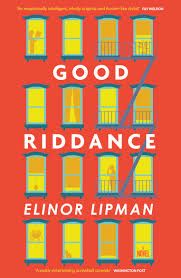Good Riddance, Elinor Lipman

I hadn’t heard of Elinor Lipman before I saw, on Twitter, that Lightning Books was publishing two of her recent novels in the UK, and had a two-for-one offer on. I admit I was attracted by the bright covers with their graphic illustrations and flashes of orange and green, and the promise they were rollicking good reads when I’d been mired in a fairly depressive period of reading and writing. But when I ordered them, even when they arrived, I didn’t know they’d turn out to be my lockdown ‘saviours’, the books that got me reading, offered me somewhere not only to spend my dwindling time but to lose myself. Reading is like meditation: you have to be able to focus on a story before you can ‘lose’ yourself in it, which might mean shutting out thoughts of anything else, be that the time or notifications on your phone. Once you have given yourself to the narrative, you are not lost at all. Quite the opposite. As in meditation, you become so focused on the world of language ordered just so that you’ve climbed into, you are more alive and present and engaged than anywhere else and ever before.
This was the problem with lockdown, wasn’t it? And with any sort of anxiety. Your brain can’t focus and your mind flits between practical necessities and future fears. I tried to read a few things which I wrote off as being too clever for me, but on reflection it was probably the wrong time. Ben Lerner’s The Topeka School, for example, which is dense and highbrow but surely I can manage it?
Enter Elinor Lipman, who has taught me – and yes I feel I needed the lesson – that a brilliant book can be funny and light and not attempt to solve poverty and that’s OK. Lipman’s heroines in Good Riddance (2018) and On Turpentine Lane (2017) turn on the same privileged stick my own protagonist is whittling down. Both Daphne Maritch and Faith Frankel find themselves, in their thirties, back ‘home’ at the scene of their adolescence, trying to unpick their families’ foibles and leave their own chaotic lives in the dust. Lipman manages to poke fun without being mean, and to layer unusual ideas, unexpected characters and madcap action onto classic plots.
She has been called the Jane Austen of modern New York, a richly deserved compliment. I love her.